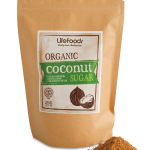If you’re wanting an alternative to highly refined sugars that have something more to
offer nutritionally than just empty calories, then check out our range of natural sweeteners. We’ve put together a guide to help you find the right natural sweetener for you, whether it be raw, Vegan, low fructose or low calorie. 
Natural Sweeteners
Agave Nectar
Agave Nectar is derived from the Agave plant and is a favourite in the raw food kitchen. It is about 1.5 times sweeter than sugar and doesn’t impart a strong flavour in your cooking. It has a low GI rating of 30, and has much lesser effect on blood sugar than white sugar with a GI of 58. The low GI rating is due to the high Fructose content which can be detrimental to health in large doses, and is not suitable for those on a low FODMAP diet.
Honey
Unlike many natural sweeteners Honey has been much studied by modern science. Despite its high fructose levels: 38% fructose and 31% glucose, Honey has other properties that provide health benefits such as antioxidants to combat free radicals: http://www.ncbi.nlm.nih.gov/pubmed/12617614 It has shown to reduce cardiovascular risk without increasing weight gain: http://www.ncbi.nlm.nih.gov/pubmed/18454257 Honey has also been shown to have antibacterial properties and has been found to inhibit Helicobacter Pylori, a bacteria that is believed to be a cause of stomach ulcers, dyspepsia and peptic ulcers. http://www.manukahoney.com/research.cfm?page_obj_id=5&archive=N&article_id=19 Not suitable for Vegans and those on a low FODMAP diet.
Coconut Nectar
Coconut Nectar is derived from the Coconut Palm by making a cut on the flower and collecting the sap. It is a very low GI sweetener with a rating of 35 and is one of the most sustainable sweeteners. It is very low in fructose and mineral rich with a butterscotch flavour.
Coconut Sugar
Coconut Sugar is simply Coconut Nectar that has been placed under heat until most of the water has evaporated. Similar to brown sugar in looks and flavour but retains some nutrients and benefits including inulin which may slow glucose absorption and help explain the low GI rating of 35.
Mesquite Powder
The Mesquite Tree has a number of uses, but the powder comes from the dried and ground up pods. Mesquite Powder is not a sweetener in the traditional sense, you can replace some of the flour in baking with Mesquite and it goes well in smoothies, adding both sweetness and a smooth malty caramel flavour. It is mineral rich with calcium, magnesium and lysine and is also very high in fibre. It has a very low GI of 25, partly due to being high in fructose.
Brown Rice Syrup
Brown Rice Syrup is made by culturing cooked rice with enzymes that break down the starches, straining off the liquid then reducing it till the desired consistency is reached. A commonly used sweetener in Vegan and Macrobiotic diets, rice malt syrup has a mellow, nutty flavour. It has no fructose and instead is made up of 45% maltose, 3% glucose, and 52% maltotriose. It has a high GI of 98, and contains some nutrients, but not in significant amounts.
Maple Syrup
Maple Syrup is a sustainably harvested natural syrup from the Maple tree. 80% of all Maple Syrup comes from Canada. It contains mostly sucrose and has a GI of 54. While it contains some vitamins and minerals they are not overly significant and won’t contribute greatly to your body’s needs. Prized for it’s natural unique flavour and available in different grades, be sure to look for the real deal. Many cheaper versions are just imitations made from flavoured High Fructose Corn Syrup.
Stevia
Stevia is a sweetener made from the leaves of the Stevia plant, and has a long history of use as a sweetener and for medicinal purposes. It has no calories and the majority of evidence shows it to be a harmless natural sugar substitute. It can be a good sweetener for those with blood sugar issues or those wishing to avoid calories from sugar. Some concerns have been raised that the consumption Stevia can confuse our bodies, with the sweet flavour producing an insulin response without the intake of sugar. Other concerns with Stevia are that it may negatively impact fertility as it was traditionally used in South America as a contraceptive, although there is no evidence of its effectiveness. There have been studies in animals but results have been mixed.

